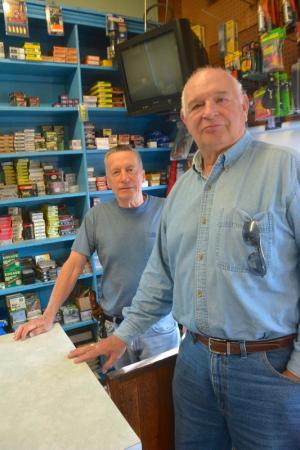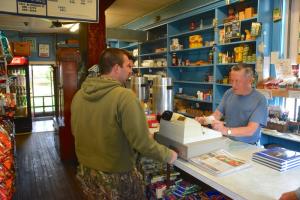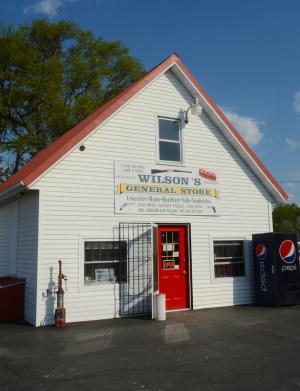Memories of growing up in rural Sussex
Dennis Crawford sits on a century-old bench at Wilson's Store, and the memories start to flow. And he's not alone. As they sip coffee, others chime in with memories of their own.
They talk about simpler days of riding their bikes and collecting bottles to get deposit money. They talk about cruising in downtown Georgetown from The Circle to Tastee-Freeze. They reminisce about pitching tents and camping in the woods.
Others talk about crazy bets they made, daring friends to eat dog food and an entire jar of hot pickles – all for 50 cents.
It's a daily ritual at the store at the crossroads of Gravel Hill and Springfield roads near Georgetown. There are two shifts of regulars – those who come around 6 a.m. and those who file in around 8 a.m. An eclectic assemblage gathers in the store each morning including state highway workers, retired DuPont workers, state police troopers, realtors, school bus drivers and lawyers.
Crawford's early life in the 1950s and early 1960s centered around the store and it has not changed much since he and his friends spent hours there drinking Pepsi – because it was bigger than a Coke – and pitching coins against the wall.
The gas pumps have been removed, and a new wall has been added to display more snacks to sell, but the interior looks as it did decades ago.
Crawford, 68, grew up near the Wilson family home and is still close friends with the man who operates the store, Jim Wilson.
Could have gone down another path
Crawford also pauses to reflect on a life that could have turned in another direction if not for strong friendships and caring relatives who took him in as a teenager. He says it's painful to recall many of his early years.
Crawford grew up among seven siblings in a two-bedroom house. In the room where his parents slept was a crib and a bunk bed; his sisters slept on cots in the kitchen.
As a youngster, Crawford struggled with strong discipline at the hands of his stepfather; he says strong may not be a harsh enough word.
Crawford now lives with his wife, Susan, in Senators along Gills Neck Road in Lewes. That's a far cry from his humble, rural upbringing. Forced out of his home as a teenager by his stepfather, he lived with his grandparents on a dirt road with no name in a modest house with no bathroom or hot water. “I was lucky to be able to go there; my grandparents were concerned about me. I was able to find refuge,” he said.
Crawford played as many sports as possible at Georgetown High School so he could take a shower. And fortunately, his aunt and uncle lived nearby so he could shower on weekends.
“My upbringing has driven me my entire life,” he said. “I did not want my kids to live like this.”
The family's 35-acre parcel near Georgetown was the former site of a German POW camp during World War II. Some of the foundations of the buildings can still be seen on the property and the community hall at nearby St. John's United Methodist Church is a converted POW barracks.
“Most people are not aware that POWs were housed in Sussex County,” he said.
In 1945, there were 4,300 German and Italian POWs in Delaware with most at Fort DuPont in Delaware City. Others were housed at camps throughout the state including eight camps in Sussex and Kent counties. The prisoners worked to build chicken houses for the new Delmarva poultry industry, worked in canneries, on farms and even helped repair the Rehoboth Beach Boardwalk.
The woods on the property were like a personal playground to Crawford and his two cousins who built forts and played in a pond, the same pond that POWs used to bathe.
Career change puts him on cutting edge
He also worked feeding chickens and doing odd jobs for local farmer Carlton Moore. “He always had something for me to do because he knew I needed the money,” Crawford said.
In addition, while still in high school, he worked as an orderly at Beebe Hospital, now Beebe Healthcare. He had designs on going into the medical field after graduation from Georgetown High School in 1964 but instead ended up on the cutting edge of the information technology industry as a contractor with major clients such as the National Security Agency and Boeing.
After taking night courses at the University of Maryland and Salisbury State University, at the age of 40 he took part in an early distance-learning program to get his degree in computer sciences from Pacific Western University in Los Angeles.
“The degree helped the company I was working for meet the educational requirements for the job I was hired for,” he said. Working for the Department of Energy, he managed a contract overseeing 700 employees.
For most of his 35-year career, he lived in the Washington, D.C. area, but knew he would return to Sussex County when he retired. He and his wife moved to Rehoboth Beach in 2010 and then in 2013 to Senators in Lewes.
Wilson's Store is a true Sussex landmark
Wilson's Store is one the few remaining country stores still in business. The former one-room schoolhouse has been moved two times, but not more than a mile. It was opened as Truitt's Store in the 1930s and then moved to its current location in 1941 and operated by Everett Johnson. The Wilson family has owned the store since 1944. Jim Wilson, the current owner, purchased the store from his father in 1970 and not long after started to sell subs and added a grill, increasing business dramatically.
J. Everett Moore Jr., a Georgetown attorney who still lives in the area, said it's the only place he knows where you can buy a meal, get documents notarized and buy a gun. Like Dennis Crawford, as a youngster Moore spent countless hours hanging around the store; he still stops by as often as he can. “Our universe was small. Most discussions centered around crops, weather and local gossip,” he wrote in his book, “Growin' Up Country: Rural Life in the 1950s and 1960s.”
The store not only sold penny candy, pickled pigs feet and pickles in jars, but also stocked hardware on its shelves.
Those who frequent the store know that the owner has carried a pistol on his belt for as long as they can remember.
And besides some of the best subs and scrapple sandwiches in the area, guns and ammo are still for sale at Wilson's Store.



























































